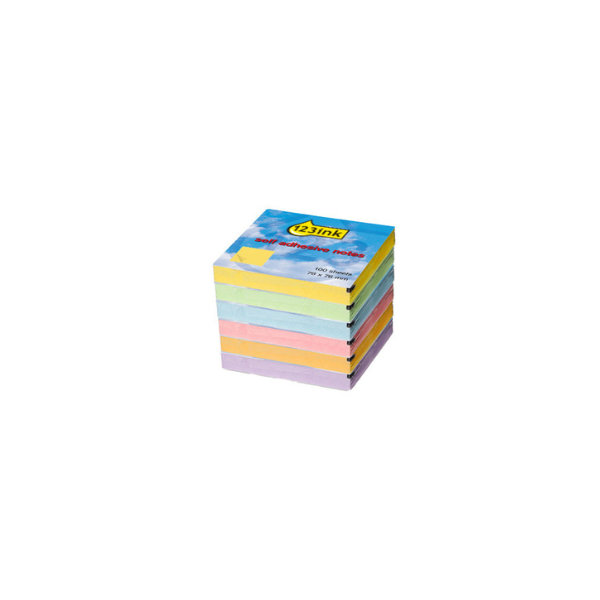- Over 400,000 clients!
- Nationwide delivery from €4.99 (max €6.99)
Menu
My 123ink.ie
This site is protected by reCAPTCHA and the Google
Privacy Policy and
Terms of Service apply.
Don't forget the paper!
80g 123ink A4 copy paper, 2,500 sheets FSC® Mix Credit

Popular products
Improving concentration skills

We often find it hard to focus on the task that is right in front of us and no matter how hard we try, we just can’t concentrate! Understanding why we cannot concentrate and recognising what is distracting us is the most helpful way to find an effective solution. People struggle to concentrate for many reasons, but some common factors include distractions such as your phone, fatigue, stress or anxiety, diet and hydration, lack of physical exercise and lack of structure.
Whether it is for school or work, studying or household tasks, we all want to know how we can improve our concentration skills. There’s no one way to improve your ability to concentrate and some methods may not work for everyone, but we have put together our top seven tips to help you get started!
Tip 1: Remove all distractions
Close social media and other apps, turn off your notifications or set your phone to ‘Focus’ so only specific notifications are allowed to come through, and put your phone away - you won’t be needing it if you are truly trying to concentrate on the task at hand. Your main focus is to complete what you need to do, so ask that you be left alone or, if possible, go somewhere you are not likely to be interrupted, such as your local library or coffee shop. We also recommend removing any unnecessary items from your work or study space as they are likely to catch your eye and distract you. By removing all distractions, you are more likely to concentrate and apply yourself to your task.Stop multitasking too!
Focus on one task at a time! Trying to carry out several tasks at the same time can often reduce productivity and your ability to concentrate properly. Examples of multitasking would be replying to an email while talking on the phone. By focusing on one thing at a time, you will be able to concentrate better and make the most of your time spent studying or working.Tip 2: Break tasks into smaller steps
You may be able to improve your concentration by breaking your task up into smaller tasks. We can often get overwhelmed if our workload is too large and this can lead us to becoming distracted and sometimes even uninterested. If at all possible, break your task into smaller, more manageable steps. Take your task step by step and you will likely maintain your concentration much better. You’ll also feel a certain sense of accomplishment as you complete your smaller tasks!Tip 3. Create a plan to add some structure to your task
It’s always a great idea to create a plan when you need to get something completed without losing concentration. Schedule specific times in your day when you need to focus on certain tasks or projects and stick to the plan as much as possible! By creating some structure to your day and having a clear plan, you will know what you need to concentrate on and how long you will need to stay focused. Once you have your main tasks completed, you can focus on less important things that may not require as much concentration.Don’t forget to take some well-deserved breaks!
Research has found that our concentration tends to decrease after approximately thirty minutes of focusing on a task! It’s important to take small breaks frequently and let your brain rest, even if it’s only for a few seconds. For example, use the ‘Pomorado technique’. Using this technique, you will set a time for 25 minutes and work on your task. When the timer is up, take a 5 to 10 minute break. When you come back to your work or study, you should find it easier to concentrate and get some quality work done! Repeat this until you complete your task.Tip 4: Try to get some more sleep
Getting enough sleep is crucial as sleep deprivation can affect attention and response times. On average, adults need between 7 and 9 hours of good-quality sleep each night, while most teenagers need between 8 and 10 hours. You can improve your sleep by:- Waking up and going to bed at the same time every day
- Exercising each day, but not right before bedtime
- Avoiding caffeine later in the day
- Creating a relaxing bedtime routine and a calm environment to sleep in
Getting some good rest can help increase your ability to concentrate, as well as your overall health.
Tip 5: Eat well and exercise regularly
Eating well and exercising regularly can significantly improve your concentration, as well as cognitive function. Eating nutritious foods such as fruit, vegetables and high-fibre foods can help to keep your blood sugars even and improve your concentration. In fact, research has found that foods like blueberries can boost your concentration and brain health! Adding omega-3 fatty acids, antioxidants and vitamins will also boost your brain health and help you focus more.Exercise is known to improve brain health as it boosts circulation, providing our brain with more oxygen and nutrients. Starting your day with a simple exercise or stretching may set you up for a productive day, but even taking a short walk away from your task can help refresh your mind and lead to you focusing better when you return! Physical movement helps to relax your muscles and body. If your body feels relaxed, so will you mind and this will lead to better concentration levels.
Don’t forget to stay hydrated!
While it is important to eat and exercise, you must also remember to stay hydrated! Dehydration can impair your concentration, so drinking enough water while studying or working is crucial. It is recommended that people should aim to drink at least 6 to 8 glasses of water a day.Tip 6: Practise mindfulness
Stress and anxiety can negatively impact our concentration abilities, making it almost impossible to focus on the task you need to complete. Practising mindfulness and meditation is proven to improve focus as our brains become calmer during this process. An easy way to practise mindfulness is to find a quiet place, sit comfortably and focus on your breathing. Notice how air enters and leaves your body and bring your attention back to your breathing if your mind begins to wander. You can start by doing this for five minutes and increase the time once you are more comfortable. By doing this, you should feel more relaxed and ready to concentrate on your task.Tip 7: Reward yourself!
Rewarding yourself can be a really effective way of improving concentration and motivation, so after a tough day of studying or working you definitely deserve to treat yourself! If you have accomplished what you set out to do, you may want to reward yourself by watching a movie with some snacks or drinks, having an arts & crafts evening or even a pamper night! This gives you something to look forward to once your task is complete. By incorporating a reward system, you should see a difference in your concentration and positive habits.It’s important to remember that improving your concentration skills takes some practice and it is likely you won’t be able to achieve this overnight. Once you recognise that you are struggling to concentrate and focus on tasks, you can start trying different methods to improve. With improved concentration, you will be able to achieve more than you ever imagined. Just be patient with yourself!
Common Questions
Why am I struggling to concentrate?
You may be struggling to concentrate for reasons such as being distracted by your phone, fatigue, stress or anxiety, lack of exercise or an unhealthy diet. Everyone is different, but these factors can lead to a negative impact on our concentration skills.
How can I improve my concentration on tasks?
You can improve your concentration on tasks by removing all distractions, getting more sleep, eating well and exercising, practising mindfulness and setting daily goals for yourself. While these methods may not work for everyone, they are a step in the right direction.
How can getting more sleep improve my concentration?
Getting more sleep can help improve your concentration because your brain is its best when well-rested. Good sleep improves your brain performance, mood and overall health. You can think more clearly and focus better in school or at work. Adults need between 7 and 9 hours of good-quality sleep each night, while teenagers need between 8 and 10 hours.
What foods can I eat to improve brain function?
You can eat foods such as fatty fish, blueberries, nuts, eggs, leafy green vegetables, fruits and wholegrains, such as porridge and brown rice, to improve your brain function. These ‘brain foods’ are full of healthy fats, vitamins and minerals that can help to improve your memory, concentration and cognitive function.
| Gallery blank white system card, 150mm x 100mm (100-pack) | ||
|
|
||
|
€3.50
(Incl. 23% VAT)
(€2.85 Excl. 23% VAT) |
in external w/house | |
















.png)








